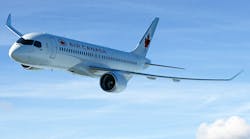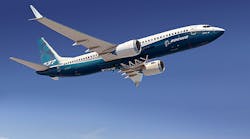The U.S. Department of Commerce intensified the debate over trade violations alleged against Bombardier Inc., in the matter of its sale of CSeries aircraft to Delta Air Lines, seeking a penalty in addition to the countervailing duties claimed in its earlier claim.
Prompted by Boeing Co.’s complaint, Commerce in late September declared that a 2016 sale of 75 Bombardier CSeries jets to Delta violated fair-market pricing standards, and should incur a 219% trade duty on future sales of the aircraft. Now, Commerce has indicated that an anti-dumping penalty of 79.82% should be added to the duty.
The initial claim suggested a highly aggressive approach to foreign trade policy by the Commerce Dept., inasmuch as Boeing’s complaint sought an 80% duty. The additional request for a nearly 80% penalty — if affirmed and enacted — would push the total assessment against Bombardier to 300%, and is likely to elevate the tensions between the U.S. and longstanding trade and foreign policy allies, Canada and the U.K., where Bombardier builds the CSeries jets.
It’s also likely to complicate the recently reopened negotiations on the North American Free Trade Agreement.
More than that, CSeries jets include components manufactured and supplied by U.S. companies, including, for example, Pratt & Whitney engines, so the further implications of the case are difficult to forecast.
Commerce investigates claims of trade violation made by private interests, and may propose countervailing duties in individual cases based on available evidence. It may also seek anti-dumping penalties against particular countries or companies.
But, the separate, and independent International Trade Commission conducts hearings on trade-violation cases and dumping charges, and rules on the validity of the claims. If the claims are upheld, the responsibility returns to the Commerce Dept. for enforcement.
In the Bombardier case, no ITC decision is expected before early next year.










